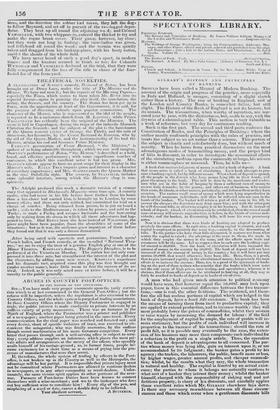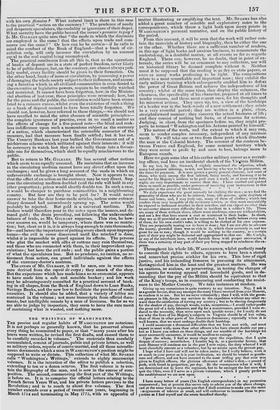GILBART'S HISTORY AND PRINCIPLES OF BANKING SHOULD have been called
a Manual of Modern Banking. The account of the origin and progress of the practice, more especially
in Italy and Holland, is meagre, consisting of a slight sketch rather than a history. The rise of banking in England, and of the London and Country Banks, is somewhat fuller,: but still slight. The History of the Bank of England is not its history, but its annals. The transactions, when worthy of narration, are nar- rated year by year, with the distinctness, but, south to say, with the dryness of a chronological table. This section is very valuable as a work of reference, but very dry for continuous reading. Such is the first part. The second and third parts embrace the Constitution of Banks, and the Principles of Banking ; where the author mostly confounds principles with the rules of practice, and
treats the subject as an art rather than a science. This portion of the subject is clearly and satisfactorily done, but without much of novelty. Whets he turns from practical. discussions on the most advantageous modes of transmitting money, and the proper kind of bills to discount, in order to investigate the economical effects of the circulating medium upon the community at large, his science is either commonplace or unsound. Thus, he tells us— A bank that receives lodgments of money is called a bank of deposit. A bank that issues notes is called a bank of circulation. Each bank attempts to pro- cure a banking capital, but by different menus. When a bank of deposit is opened, all the people in the district who have money lying idle in their hands, will place the money in the hank. This will be done by the merchants and trades- men who are in the habit of keeping by them a sufficient sum of money to answer daily demands; by the gentry, and others out of business, who receive their rents, dividends, or other monies, periodically, and disburse them as they have occasion. The various small sums of money which were lying unproductive in the hands of numerous individuals, will thus be colks,ted into one stun in the hands of the banker. The banker will retain a part of this sum in his till, to answer the cheques the depositors nary draw upon him ; and with the other part he will discount bills, or otherwise employ it in his loudness. But if, instead of a bank of deposit, a bank of circulation only be established, then the several small sums of money will remain unproductive, as before, in time hands of various indi- viduals; and the banker, in discounting bills, will issue his own promissory notes.
Now it is obvious that these two kinds of banking are adapted to produce precisely the same effects. In each case, a banking capital is created, and each capital is employed in precisely the sone way,—naniely, in the discounting of bills. To the parties who have their bills discounted, it matters not from what source the capital is raised ; the advantage is the saute to them, the mode in which they employ the money is the same, and the effects upon trade and commerce will be the same. Let us suppose that in each case the banking capi- tal created is 50,000/. Now the bank of circulation will have increased the amount of money in the country by 50,0001. The bank of deposit will not have increased at all the amount of Money in the country ; but it will have put into motion 50,0001. that would otherwise have been idle. Here, then, is a proof, that to give increased rapidity to the circulation of money, has precisely the same effects as to increase the amount. Here, too, is a proof of the ignorance of bank- ing on the part of those writers who consider that the banks which issue notes are the sole cause of high prices, over- trading, and speculation ; whereas it is obvious, that if those effects are to be attributed to ban%ing at all, they may as fairly be ascribed to banks of deposit as to banks of circulition.
A man who had given much attention to political economy would have seen, that however equal the 50,0001. may look upon paper, there is this essential difference between the two transac- tions,—one is real, the other fictitious. The scattered, and there- fore the all but useless portions of capital which are lodged in the bank of deposit, have a bond fide existence. The bank has been the means of turning them from inert to productive capital; they are applied to extend production, and to increase wealth : they will most probably lower the prices of commodities, whilst they sustain or raise wages by increasing the demand for labour : if the field for the employment of capital be ample, the rate of profits will re- main stationary, but tire profits of each individual will increase in proportion to the increase of his transactions; should the rate of profit fall, as it is possible may eventually be the case, the exten- sion of his business may more than compensate each individual for a reduction in the profit on a single article. Thus, the operation of the hank of deposit is advantageous to all concerned. The par- ties whose money was lying idle, gain an interest upon it, or are accommodated by its lodgment; the banker gains a profit by his agency; the traders, the labourers, the public, benefit more or less, by higher wages, greater annual profits, and cheaper commodi- ties; whilst, be the results what they may, the whole transaction is natural and healthy. The capital is limited by an actual exist- ence; the parties to whom it belongs are naturally cautious to what sort of a banker they intrust their money ; whilst the banker himself, charged with the responsibility of risking real and not fictitious property, is chary of his discounts, and carefully applies those excellent rules which Mr. GILBART elsewhere lays down. Is there any necessary resemblance between all these circum- stances and those which occur when a gentleman discounts bills with his own flimsies f What natural limit is there in this case to the practical "action on the currency ? " The prudence of needy and desperate speculators, the credulity or ignorance of their dupes. What security have the public beyond the issuer's promise to pay Is Mr. GILBART quite sure that "the mode in which the discounts are employed is the same? that the effects upon trade and com- merce are the same ?" Or how can he be certain—if he calls to mind the conduct of the Bank of England—that a bank of cir- culation only, will only increase the circulation by an amount equal to the real capital lying unemployed. The practical conclusion from all this is, that as the operations of banks of deposit are in a state of perfect freedom, never likely to be of public danger, but, on tke contrary, are almost always pub- licly useful, every facility should be given to their formation. On the other hand, banks of issue or circulation, by possessing a power of deranging the whole society subject to their influence, and assum- ing a function which in all civilized communities is even denied to the executive or legislative powers, require to be carefully watched and restricted. It cannot have been forgotten, how, in the Ministe- rial abortion of last year. these principles were reversed; how, but for the press and the public, the circulation would have been stimu- lated to a ruinous excess, whilst even the existence of f.uch a thing as a bank of deposit seemed to have been totally forgotten. We should not, however, have referred to these things,—we should not have recalled to mind the utter absence of scientific principles— the complete ignorance of practice, even in so small a matter as the effects of change for a five-pound note—the blind and reck- less indifference upon such a momentous subject as the currency of a nation, which characterized the ostensible concocter of the measure, had that measure been finally settled; but it has not. The Country Bankers last year bullied the Government out of a michievous scheme which militated against their interests : it will be necessary to watch lest they do not bully them into a favour- able one for themselves, which shall be equally mischievous to the public. But to return to Mr. GILBART. He has several other notions which seem to us equally unsound. He maintains that an increase in the circulating medium cannot have any direct effect upon the exchanges; and he gives a long account of the mode in which an unfavourable exchange is brought about. Now it appears to us, that the effect of an action on the currency may be very direct. Sup- pose the circulating medium doubled (and the rule will hold in any other proportion); prices would shortly double too. In such a case, it would be cheaper to purchase commodities in a neighbouring country. But how are they to be paid for ? It would never answer to take the dear home-made articles, unless some extraor- dinary demand had miraculously sprung up. The notes would probably be rejected. But gold is a universal medium. The traders would therefore pour in the notes upon the issuers, and de- mand gold ; the drain preceding, not following the unfavourable balance of trade, as Mr. GILBART supposes. This rise, he how- ever assures us, would be temporary, where there was no restric- tion; but, short as it is, it is always long enough to ruin thousands; for—and hence the importance of putting every check upon improper issues—the evil is never discovered until the mischief is done, whilst it is impossible to guard against its effects. The persons who glut the market with silks or cottons may ruin themselves, and those who are connected with them, in their improvident spe- culations; but here the evil ends ; and the public gains a portion of what the speculators lose. But no prudence, no caution, no re- tirement from action, can guard individuals against the effects of the currency-doctor's nostrum. The errors of Mr. GILBART, it will be seen, are in some mea- sure derived from the esprit de corps; they smack of the shop. But the experience which has made him a so-so economist, appears to have made him a safe and sensible banker ; and his work may be advantageously consulted for a practical account of bank- ing in all shapes, from the Bank of England down to Loan Banks, Savings Banks, and the new law to facilitate the purchase of small annuities. It should also be added, that a variety of tables are contained in the volume ; not mere transcripts from official docu- ments, but intelligible recasts by a man of business. So far as we are able to judge by inspection, they seem to have the rare merit of containing what is wanted, and nothing more.





















 Previous page
Previous page